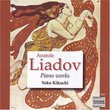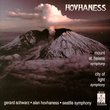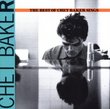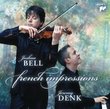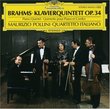| All Artists: Sergey Prokofiev, Valery Gergiev, London Symphony Orchestra, John Alley Title: Prokofiev: The Complete Symphonies Members Wishing: 0 Total Copies: 0 Label: Philips Original Release Date: 1/1/2006 Re-Release Date: 5/16/2006 Genre: Classical Styles: Historical Periods, Modern, 20th, & 21st Century, Symphonies Number of Discs: 4 SwapaCD Credits: 4 UPC: 028947576556 |
Search - Sergey Prokofiev, Valery Gergiev, London Symphony Orchestra :: Prokofiev: The Complete Symphonies
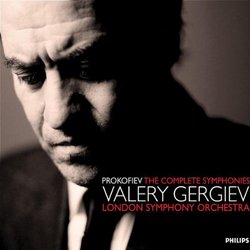 | Sergey Prokofiev, Valery Gergiev, London Symphony Orchestra Prokofiev: The Complete Symphonies Genre: Classical It should come as no surprise that Gergiev is in his element in Prokofiev's symphonies. Whatever his failings in other repertory, he's always had a knack for visceral excitement in Russian music, sometimes at the expense o... more » |
Larger Image |
CD DetailsSynopsis
Amazon.com It should come as no surprise that Gergiev is in his element in Prokofiev's symphonies. Whatever his failings in other repertory, he's always had a knack for visceral excitement in Russian music, sometimes at the expense of lyric or lighter moments. And so it is here. Gergiev is a bit heavy-handed in the popular Classical Symphony, Prokofiev's homage to Haydn and Mozart. But he delivers high-octane power in the three steel-age symphonies that follow (the set is especially notable for the inclusion of both versions of the Fourth). The popular Fifth is done with passion, as is the neglected and underrated Sixth. Most surprising is the Seventh, an outwardly amiable piece with a sometimes-sardonic subtext, which Gergiev delivers in a natural, well-balanced interpretation. The London Symphony is a big part of the set's success. It's one of the world's great orchestras, here captured live in concert, and far superior to Gergiev's home band, the Kirov Orchestra. Along with fine ensemble playing, the LSO scores in making Prokofiev's important wind writing and solos crisply vivid. Rivals include outstanding individual recordings like Ancerl's Fifth, Malko's First and Seventh, and Kuchar's budget set on Naxos, but this convenient, well-performed box set is a heavyweight contender. --Dan Davis Similar CDsSimilarly Requested CDs
|
CD ReviewsAn Extraordinary Set D. A Wend | Buffalo Grove, IL USA | 05/31/2006 (5 out of 5 stars) "I ordered this set after I heard an excerpt from Gramophone's sampler disc of the Fifth Symphony; the performances were everything that I would have hoped for. Valery Gergiev clearly has a love of Prokofiev's music and has had long experience conducting the operas The First Symphony is beautifully played with the Finale played with a slightly faster tempo than I am accustomed to that even more brings out the exuberance of the music. The original and revised versions of the Fourth Symphony are included, and the revised version follows the First which makes an interesting contrast. I had not heard the revised Fourth for some years and it was very nice to have it again. The Symphony, based on the ballet The Prodigal Son, received its revision around the time Prokofiev wrote his Sixth Symphony and so there is music more reminiscent of his later orchestral writing mixed with the ballet music from the 1920's. The slow movement is played with particular beauty by the LSO and the third movement is played lightly with playful shading. The symphony is brought to an exciting close with the trumpet coda the composer added as a nod to Stalin. The Second Symphony is the least performed and is noted for its heavy counterpoint and sounds as if describing some industrial complex as found in Fritz Lang's Metropolis. The symphony is in two movements with the second being theme and variations. Valery Gergiev is in his element here and his recording surpasses the one by Neeme Jarvi in clarity of performance. The Third Symphony benefits from Maestro Gergiev's performances of The Fiery Angel from which the music is drawn. The symphony has a "raw" sound that gives it more drive than found in a performance of the opera. The opening of the symphony is a bit faster than some performances that I have heard and the speed has adds tension to the music. The slow movement is nicely paced and beautifully played while the third has a nice ghost-like feel from the strings punctuated by moments of agitation drums. The final movement if marvelously played with Gergiev keeping a steady tempo and the LSO negotiating the tricky passages perfectly. The 1930 version of the Fourth Symphony is paired with the Fifth and is lovingly played. The Fifth is majestic in this performance; one immediately gets carried away by the music. As many times as I have heard the Fifth it would be hard to recall a more shattering and triumphant first movement. The scherzo is marvelously played, a true whirlwind of music encompassing sarcasm and terror. The slow movement is serenely austere and the finale brings out the hesitant optimism of the movement ending with a splendid heroic conclusion. The Sixth Symphony is one of my favorites, and I have recordings by Neeme Jarvi and Mravinsky. The Gergiev starts out a bit slower and gradually builds to a faster tempo as the music builds until it crashes only to slowly build again and end quietly. The middle movement is superbly played; the menacing chords of the beginning setting the tone for the sorrow theme; the finale is a wonderful mix of jubilation tempered by fear. The depth of feeling that Gergiev gets from the LSO is what makes me place this recording as my favorite although I intend to keep my other recordings as well. The Seventh Symphony, like its predecessors, is well played. The melancholy of the first movement is beautifully conveyed as is the wistful waltz of the second movement, harkening back to Cinderella and War and Peace. Gergiev has chosen to end of the symphony with the original melancholy conclusion rather than the additional bars to give a "happy ending" more suitable for a Stalin prize. The recordings are nicely engineered and I was able to pick out aspects of the orchestration that had been mixed with the orchestra in other recordings. For example, the piano parts that Prokofiev wrote in the revised Fourth Symphony came through rather than being lost in the overall sound of the orchestra. One can argue in favor of their favorite performance of the symphonies but Valery Gergiev has performed quite a feat with these recordings. All of the symphonies were performed in concert but there is no hint of an audience and there is no applause at the end of the symphonies. " A worthy set, brilliantly recorded, with a significant short Larry VanDeSande | Mason, Michigan United States | 01/31/2007 (4 out of 5 stars) "I decided to buy Gergiev's intergral set of Prokofiev symphonies after seeing no less than 5 critics from Gramophone magazine recommend it either as a gift for themselves or someone else in that magazine's December issue. I have learned the English listen to, and respond to, classical music differently than Americans; I have also learned that any production receiving such a widespread rave has a lot going for it. After listening repeatedly to these symphonies, I was consistently torn as to giving this set 4 stars or 3.5 stars. There clearly is a significant enough shortcoming in this set -- the inadequate performance of Symphony No. 6 -- to keep this from receiving top recommendation. I decided it was worth 4 stars because of the multitude of other good things going on inside this set. The good things begin immediately with the Gergiev-LSO collaboartion of the Symphony No. 1 "Classical". I read someone that disliked this performance because it was too stodgy. I cannot attest to such a viewpoint; I believe the performance is a good one, perhaps not as good as Ormandy's rapid fire address on the old Sony CD, but lively throughout and performed in keeping with the classical spirit of the thing. You learn first in this symphony that this set will be characterized by fine playing from the London Symphony Orchestra and oustanding recording technology that brings extra life to timpani and low brass, something that gives the LSO a darker, almost Russian, sound. Perhaps my favorite and, ironically, most curious performances are those of the Symphonies 2, 3 and original version of 4. Never before had I understood the common threads that run through 2, 3 and the opening movement of 4 until I heard them under Gergiev's baton. I always thought of 2 as dissonant modernism reminiscent of a period factory at work -- perhaps a score for the 1950s television program "Industry On Parade". Here, Gergiev presents some of those characteristics but with Boulez-like clarity and sharpness. He continues along similar lines through the more musically developed Symphony 3 -- which unfolds like a Bernard Herrmann film score and later as an egregiously militaristic episode -- and into the opening of the original version of Symphony 4. It was instructive for me to be able to listen to one conductor's view of both the original 1930 version of Symphony 4 and the composer's revision from 1947. Both inhabit Prokofiev's world of ballet but the original continues the manic capacities first presented in Symphonies 2 and 3, while the revision -- even though still energetic and sometimes coming off as a locomotive -- leans far more on Prokofiev's "French Russian" values of ballet, tone painting and more subtle coloring. The more Shostakovich-like Symphony 7 also shares many of these attributes under Gergiev's direction. I was not particularly enamored with the opening movement of the famous Symphony No. 5, one of the few mid-20th century symphonies to be instantly accepted by audiences worldwide. However, I was bowled over by the excitement and tension Gergiev builds in the Allegro Marcato, whose pace is absolutely riveting. Ther remainder of the performance was good. However, I found it deficient compared to another British performance from a similar era -- the 2002 concert reading by the BBC Philharmonic and Gianandrea Noseda, released by BBC Magazine. I was all set to upgarde my score on this set until I listened, again, to Gergiev's rendition of the Symphony No. 6, which is unquestionably the composer's greatest achievement in the symphonic format. There is no other way to say it -- I was shattered by disappointment. How could Gergiev motor along through the symphonies doing so well, getting the London Symphony to sound so Russian, and capturing all the motion, pathos and dance Prokofiev put into these works ... and come up with such a clinker in the Symphony No. 6? For anyone that isn't familiar with it, the Symphony No. 6 is widely considered Prokofiev's greatest symphonic masterpiece. Not as popular as No. 5, it nevertheless deals with many of the same issues -- war, remembrance and humanity as expressed by a Soviet composer in the era of World War II, a time when composers flourished in the USSR with the great patriotic war as their backdrop. Yet, Gergiev's version of this masterpiece almost completely misses its point. The first movement generates all the angst, sadness and loss from the world war, which took 25 million Russians to their graves and incited some of the world's fiercest and most time-honored battles in Stalingrad and Leningrad. But I think Gergiev misses all this in the symphony, which sounds to me like a literal run-through. Neither does the optimism of future days Prokofiev wrote in the closing Vivace -- which Mravinsky captured so well in his many recordings -- come through with much vigor. Following the masterly work of the conductor and orchestra -- not to mention sound technicians, who do another fabulous job with the Symphony 6 -- this performance let me down more than anything I have heard in months. Still, this is a worthy set, reliably traversed by conductor and orchestra, brilliantly recorded in stereo (not SACD), and with 16 pages of detailed notes and photos that help the listener better understand the composer, the history of the individual symphonies, and their place in the world. Ironically, one of the photos shows Mravinsky and the composer during the premiere of the 6th Symphony. Decca clearly has a winner here and it's not hard to see why all those Gramophone critics promoted this package. If only that Symphony 6 had stood up to -- or even in the shadow of -- the great Mravinsky performances, this set had the potential to be a best in decade production. Still it's a very good one but it eludes magificence on the basis of its failure. Still recommended but don't throw out your favorites and do try to locate a copy of Mravinsky's 6th Symphony." Gorgeous, Haunting, and Exciting. Paradise Lost | Poland, OH USA | 06/01/2006 (5 out of 5 stars) "First off, I suppose I should mention that I'm a truly novice classical music listener, and can't tell you how this ranks up at all against other Complete packages or even individual performances of any particular symphony by whatever conductor; what I can tell you is...
This is quite possibly some of the most fanastic work I've ever in quite some time. For those of you who might have come across this complete package of symphonies because of its cheap price and were curious to whether or not you should invest, knowing really nothing about the conductor or the music inside, as was my case, you should definitely look into this. Although I immensely enjoy rock from the 60s and 70s, the music heard in here made my heart race faster and harder than even the most remarkable guitar solo. From what I've read before listening to this, the conductor, Valery Gergiev, is quite possibly the pre-eminent director of Prokofiev's works, and this high-ranking is most assuredly deserved. He leads the London Symphony Orchestra through rousing renditions of seven of Prokofiev's symphonies, as well as a second version of his Fourth. As seems to be the case with much classical music, high-quality sound usually seems to be accompanied with a less-than-inspired performance by the orchestra performing the piece. This is, thankfully, not the case with this recording. The sound is brilliant, if that word can be applied to sound, and the performance is nothing short of amazing. At its loudest and most bombastic, as in the case of the third symphony, every instrument still comes through loud and clear. No part seems to single-handedly overthrow the others in the piece. Even at its most delicate, the orchestra is still quite audible, precise, but still glorious in its sound. It seems to me that there is very real emotion flowing through all of the Symphonies, especially through the more grandiose passages. I won't go into any of the particular pieces themselves, as D. A Wend has already done a great job of that; this was mainly to inform you, I hope :), of this particular rendition's merit based more on performance and sound, since I have no previous knowledge of the symphonies. Anyway, for those of you who know nothing about this man's works will be in for quite a surprise, I know I was. Brilliant performances that never become boring or stale, with each symphony being entirely of their own. After listening to this, I was also surprised by the fact that the composer does not seem to be more well known outside of the classical community. I had only heard of him until recently and decided what better way to be introduced than by having all of his symphonies conducted by the man who apparently knows them best. Easily a five-star product." |



